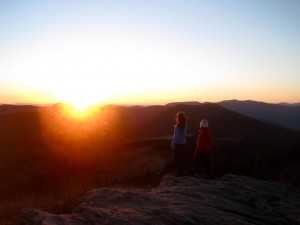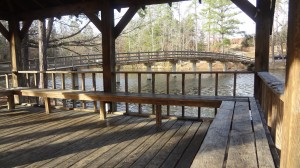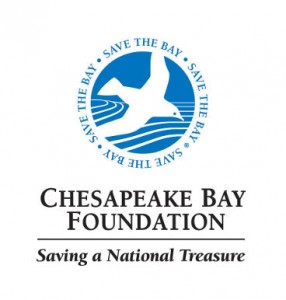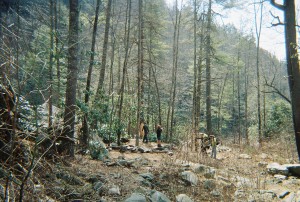As we are approaching the end of the year in Earth Lodge, I’ve been reflecting on the many things we’ve learned from the class. I learned so much about the city of Richmond, the James River, the entire James River watershed, and geography in general. I’ve also learned a lot about myself and what I am capable of as a student, but also as a human being. While much of my newfound knowledge has come from Professor Lookingbill, my peers, and my own personal reflection, I believe that one of my greatest teachers this year was the nature surrounding me.
Looking back over my past blog posts, many of them tended to talk about the lessons nature teaches. In one of my reflection posts, I reflected on the fact that although I was so stressed out from my schoolwork, the wildlife around me just focused on living. Thinking about how wildlife lives simply and survives daily causes our concerns and stress to seem petty and unimportant. It makes me question why I worry about controlling my own life. Although I can control a lot of what goes on in my life, most of the time things will just happen to me and I will have to deal with them as they come. With this perspective, there is no need for stress or worry. This is one of the most important and useful lessons nature has taught me this year.

Another lesson that I’ve learned is that, while exploring the natural world, humans can seem so small and insignificant. The fall break trip showed me this, but the backpacking trip that me and Molly went on showed me this to the extreme. Walking on slippery rocks on narrow ledges frightened me because it was like seeing my life flash before my eyes. A wrong step could’ve sent me over the edge, and it would have had tragic results. The rocks and trees would not try to prevent my fall. They would keep on being rocks and trees and watch silently, no matter what kind of a person you were by the standards of our society. That image of taking a wrong step constantly flashed through my mind during that trip and showed me just how dangerous nature could be. None of the challenges I faced had to do with human machinations. It was simply surviving in the wilderness. Stepping out of my comfort zone like that caused me to see just how awesome the natural world is and how it cannot be controlled by humans.
Now that I am able to see the lessons that nature continuously teaches us, I am confident that I will keep being taught new lessons. Through my community service opportunities, I have also been able to learn how nature brings people together. While volunteering with Ralph White, it was easy to see the clear dichotomy between the richest of the rich living by the river in fancy apartments and the homeless people living right on the river bank in makeshift homes. The beauty of the river and its environment attracts any and all kinds of people to it. When Ralph White spoke of different socioeconomic classes all fishing on the river, I could see again how the geography brings people together to create a community. Our community of Earth Lodge has also benefited from this quality of nature through our volunteering experiences together. Me and my Earth Lodge peers worked toward a common goal of cleaning up graffiti and trash to allow the natural beauty of the river to shine once again. Not only does the beauty of nature bring people together to appreciate it, but also to take care of it.
Because the natural world does teach us all of these different lessons about life and community, it is very important to keep it healthy. If volunteers and workers didn’t help to clean up, maintain, and teach about wilderness areas and places of natural beauty, these places wouldn’t attract people to them. Those people would then never have an experience that they could learn these lessons from. The Chesapeake Bay Foundation has done a wonderful job of providing educational opportunities for people who want to learn about their bay and the environment surrounding it. Our canoe field trip with the Foundation taught me so much about the ecosystems within the nooks and crannies of the bay and the bay’s inhabitants. I learned what characteristics constitute a healthy waterway, such as high dissolved oxygen levels, and found that the James is a fairly healthy river.
Another organization that focuses specifically on the James River watershed is Envision the James. My group’s final project is a GeoStory on the Envision the James website that teaches the public about Pony Pasture Park, a specific area on the river. Our GeoStory will explain the key geological and biological features of Pony Pasture, as well as illustrate the importance of riparian buffers and the conservation of the park. We hope that this project will make people more aware of the natural environment of the park and keep it clean. This way even more people will be able to experience the wilderness of Pony Pasture and learn the same kinds of lessons that I have learned from the natural world.
Wilderness is everywhere, as William Cronon suggests in his article. I believe that I have learned just as much from the nature at my reflection spot in the gazebo as I have from my backpacking trip in the Smokies. The fact that nature is inherently wild, no matter what is around it or where it is located, allows nature to constantly teach humans lessons about life and give us a new perspective. Nature is so vitally important because of its capacity to teach us that it is imperative that we return the favor by keeping it alive and healthy. Now that I have had experiences within the context of Earth Lodge, I hope that I can take the lessons I’ve learned with me as I continue college and through the rest of my life.



